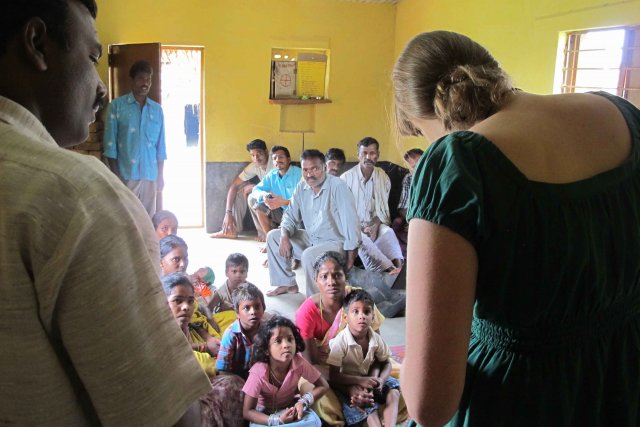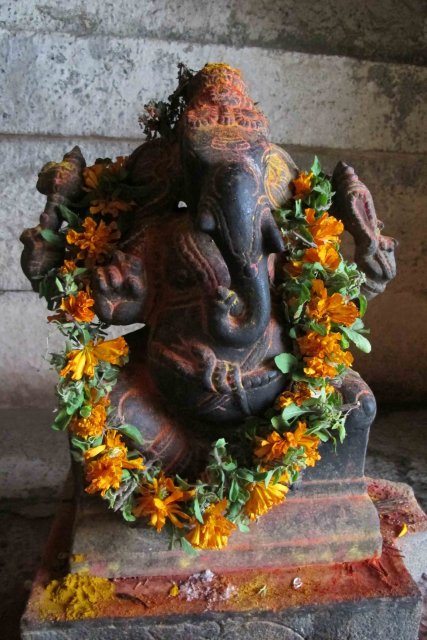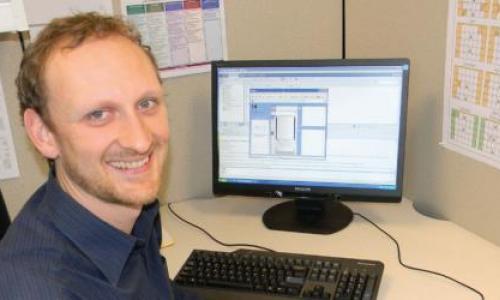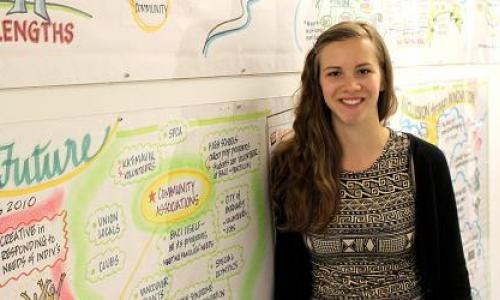
Having gone on 2 International Co-op work terms previously, Brittney Merryweather, a BPK Co-op student and a Behavioural Neuroscience (BNS) Major, is no stranger to going abroad. Her previous placement, in 2009, as a Primary Two teacher and assistant administrator at a school for disadvantaged families in Rwanda showed her an entirely new world. Following this experience, she came to realize that she wanted to pursue a career in development.
This led to her search and procurement of an International Co-op position with Cosmic Volunteers in Summer 2011. Cosmic is an American not-for-profit organization that sends hundreds of volunteers and interns from around the world into developing countries to gain experience in their field of interest. Brittney decided to select Bangalore, India as her location of choice.

I have always been drawn to India as it is the destination of choice for many spiritual journeys, and highly talked about as a place to both love and hate; simultaneously or vacillating between the two extremes weekly, daily, or even hourly. India is intense, and I have always believed that I would have to understand the third world before experiencing India so that I could focus on the multi-dimensional aspects of the country beyond the poverty, hunger and language barrier.
I travelled up north for a few weeks in May before heading down south to start my placement. This enabled me to see some of the diversity of the Indian terrain, culture and climate. I travelled to Punjab, where the weather was reaching highs of about 42 degrees Celsius in the afternoon; Bangalore, where when it rained it was as if the world's oceans were crashing down on me, and Shimla, the city in the sky where I travelled along twisting corkscrew roads with houses that stacked like a staircase of Lego and elevators that were installed to get to parallel streets. The view spanned the entire mountainous region, smog hazing the distant mounds.
Also up north, there was very little English spoken, and the language barrier was socially isolating, but permitted objective observation of body language and non-verbal communication. Sometimes I would start to nod off and the language would take hold of my semi-consciousness. With no awareness of semantic breaks, my mind played tricks with the string of rhythmic sounds presented to it. Sometimes I would hear English encased between the Punjabi and my mind would fill in the gaps with an imaginary script. In Bangalore, English is more prevalent, though often I would encounter non-English speaking people. I learned a bit of basic Kannada, the language spoken in Karnataka, and was able to get by on a combination of English, Kannada and Hindi.
In general, and throughout all parts of India that I visited, I noticed several similarities. One of which is that upon first observation, rules of the road do not seem to apply. Driving here is a bit insane, everyone is everywhere and traffic signs or lights are minimal. Motorcycles carry as many as 3 passengers, of which only the driver is required to wear a helmet on the main road. It was quite comical to see a completely stocked roadside helmet vendor, with not a potential customer insight. Vibrant saris and colourful scarves trail behind the bikes as women sit side-saddle on a metal canister of death flying down the freeway at 100+ km/hr, the light daintily catching the numerous jewels and bangles, dancing brightly across necks and wrists.
All over India has been sensory overload. Tastes and smells are heightened, vacillating between the extremes of orgasmic rapture and volatile discomfort. Body odour and wafting fecal matter pollute the air outside, while the aroma of fresh-cut vegetables and a fusion of Indian spices flow through the houses. Outside, there are stray dogs everywhere! And, the markets here are amazing. For what seems like 10K, slender streets weave in and out of a sea of people, stacks and stacks of vibrantly coloured cloth to the left and right, in front and behind. People shouting prices and greetings. Smiling and laughing, moving slowly through the hustle and bustle of cultural bargaining.
Working with Cosmic Volunteers
In India, the health care internships provide hands-on experience in clinics and hospitals. The internships can either be in urban or rural settings, and the placements involve providing primary care to locals. Interns do this by assisting in activities such as accompanying doctors on their rounds, assisting with physical therapy, participating in vaccination programs and exploring different treatments for various ailments. Over the course of the semester, I worked at Lokhande Hospital, Bangalore Baptist Hospital and volunteered at Lovedale Foundation. Over the course of the two months, I realized that I didn't like medicine in practice. I love medical research, and I love teaching about health and medicine, but I found out that I have a phobia of sick people, and being inside the hospitals and near the patients caused me so much unnecessary distress. This led me to switch from working at Bangalore Baptist Hospital to Lovedale full-time.

I spent one month at Lokhande's Hospital in Banaswadi. I shadowed Dr. Lokhande himself, and was an observer during his outpatients and a few surgical procedures. Dr. Lokhande is an intelligent and compassionate man with a genuine smile and purposeful walk. He believes that medicine starts out as a science that progresses to a way of life. For science, you need to know your facts. Know all the information in the books. He says you need intelligence for this aspect of medicine, something that you are born with. He then claims that over time, medicine becomes an art. It takes on a different form as you gain different perspectives. Finally, once you have gained wisdom, something that you must acquire, medicine becomes a philosophy, a way of life. His wife, Mrs. Susan Lokhande, is equally as passionate and charming. She is the mother hen of the hospital; she looks after everyone, oversees the hospital at the staff level and is the hospital's head nurse and counsellor. Susan took me under her wing and made me feel very welcomed in her hospital and treated me like family for the entirety of my stay in India.

For the last month of my placement, I worked with Lovedale to establish health, hygiene, sanitation and clean water education. The Lovedale Foundation is an Indian not-for-profit organization that has designed and implemented an innovative module in education within rural India. Founded and run by Jenny and Rajesh Verma, Lovedale has been in existence since 2001 with a focus on redefining the existing education system with scalable and sustainable solutions. Their aim is to empower underprivileged and deprived children with the quality education that puts them on par with other children from more advantaged backgrounds. When I started working for Lovedale, they made me feel as though the work I was doing mattered, which inspired me to do the best I could do. I was really looking forward to collaborating with them and their team on the health and hygiene community outreach programs.
I designed and wrote a thorough CPR manual and gave staff CPR training. I then designed a multi-level basic oral and dental hygiene course for 3-5-year-olds and 6-12-year-olds. I instructed the course for the hostel children and gave staff training for the teachers to instruct the course for the school children. Seeing an opportunity to collaborate with both Lovedale and another organization called Quarry Workers and Rural Integrated Development Society (QWARIDS), I designed a 6-month community health education outreach program that would work in partnership with the capacity-building organization that I started in January called Koga International Development Association.
This international co-op placement has allowed me to build international relations and collaborate with two not-for-profit organizations with the goal to initiate and sustain health education outreach programs in the quarries of Bangalore, Karnataka. As discussed by the three organizations, each education program will target one quarry village and will take approximately six months to complete, with 1-2 hour courses being held twice a month. The programs will include instruction on basic biology, basic hygiene and information sessions about alcohol, basic sanitation, basic health and basic nutrition. The programs will also ensure that each quarry has access to proper handwashing facilities, toilets, adequate access to water, and safe wastewater disposal systems.
Reflections
My biggest concern coming here was that there would be a lack of work for me because of my lack of experience and inadequate training. Although that was true, and that I did not actually "work" on or with patients in the hospital, I gained a lot of experience in the hospitals as a front-row observer. I saw everything, from many different perspectives, and was allowed to ask as many questions as I liked while patients were there, or along with the doctor, which was invaluable. With Lovedale, I had the freedom to start my own projects because I have a specific background and was looking to offer specific skills. I absolutely did not want to do menial tasks because I have done that in the past. I know there are endless to-do lists with charitable organizations around the world, and I wanted to start something new, and Lovedale gave me the opportunity to do that! Now that we are collaborating, I am excited to continue my work with Lovedale. My life outside of work here has been really amazing. Because Cosmic works in partnership with Lovedale, I was able to meet all of the Lovedale staff and volunteers right from the beginning. There was always a large turnover of new volunteers because of summer vacation, so I met many really great people! We all lived in Anagalapura together, which is an incredibly small village, so we all lived only a few houses away from each other. There was always someone's house for tea or biscuits or a movie night, and we became quite a close-knit family! Every once in a while we would all go out for dinner, which was a good break from the food provided at the hostel. The food wasn't bad, it was just a bit redundant, and it was nice to have a drink, speak at a normal rate and talk about things that we could all relate to, especially our experiences here and how they compared to home.
I also became very good friends with the warm-hearted Mrs. Lokhande, and we went volunteering at different places in our free time. It was interesting to volunteer with an Indian in India as volunteering is not as ingrained in their culture as it is ours, so it seemed like more of a big deal here. Other than that, most of my time outside of work was spent travelling or visiting. I have discovered that Indians love visits. I spent a lot of time visiting and getting to know the people of our small little village.
I think one of the most important things I learnt about Indian culture was to tell the difference between sincerity and cultural obligation to accept. I was first introduced to this cultural issue in the introduction to India manual provided to me by my supervisor, however, I had not prepared for it to translate over into the workplace. I realized that vagueness about details usually means that they are not sincere about doing what they say they will do, whereas specific time and date offered by the other person means it usually will happen. However, I also discovered the distinction between offering these details myself and having them offer the details, if I offer them, it is the same as having no details.
I did also learn that vagueness can be beneficial in a culture. Commonly, back home, supervisors like to have very detailed outlines of current projects. However, I learnt that here, if you do that you get roadblocks and many "not possible's". I found that generally speaking, if the idea is a good one and your supervisor likes the idea, just go for it and don't bother them with the tiny details, just do it and present the final product.
International Co-op in a Developing Country
I love working in development, and I am fortunate to have found two International co-op placements in developing countries. I enjoy working on projects that may impact a national economy, may help slowly eradicate extreme poverty and hunger and play a role in changing someone's life. Through both co-operative experiences, I have seen many different types of organizations and evaluated their approach to addressing the issues of development. I can now say that after these two experiences, I have a fair understanding of the varied approaches and have decided on one that I wish to pursue: operational capacity building. I believe it will target the largest groups of people, and be beneficial to more individuals around the world.














